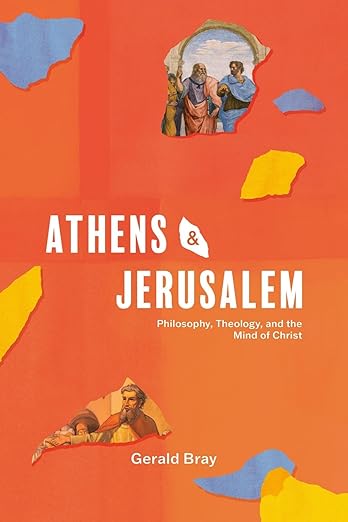Gerald Bray’s, Athens and Jerusalem–Part Three 2025-04-03T21:01:58-04:00 Ben Witherington
The summary of the substance of this book on Amazon says the following:
“In Athens and Jerusalem, Gerald Bray shows how history has been shaped by a myriad of attempts to relate philosophy and theology. Bray’s tour spans from the early church to the present, pointing out impacts on the church, academy, and society. Athens and Jerusalem offers a lively and accessible chronicle of the relationship between philosophy and theology and how we can think about both today.”
In this post we will give you a sample of some of the kinds of discussions philosophers prompted for theologians. Commenting on the difference between Protestant, Catholic, and Orthodox approaches to Greek philosophy, Bray is surely right that both Catholics and the Orthodox, have engaged, some would say drunk, more vigorously from the well of Greek philosophy than the Reformers, and many later Protestants. (p. 4). In general, he is right about this, particularly if we are talking about the pre-modern period. There is a reason, for instance that John Wesley insisted that the Bible should be the basis of all good theological thinking, not tradition, not reason, not philosophy, not experience. There is a reason why the early Methodists at Oxford were called Bible moths, or even Bible bigots.
This is very different from what we find in Augustine or Aquinas or some of the Eastern Fathers, for example the Cappadocians. And famously, Protestants had trouble deciphering the differences between the Orthodox and the Catholics. One caricature was that the Orthodox are just Catholics with beards! But the Protestant allergic reaction to incorporating Greek philosophy into theology, or using Greek categories to talk about God (e.g. immutability, impassability, aseity etc.) had some good examples to follow from the early church, for example, Tertullian , or even Irenaeus in his critique of the Gnostic philosophy=heresy. In the Gnostic world, salvation was based on what you know, grasp, understand, of the deep truths about the Logos etc. Not who you place your faith and trust in. In short, it was salvation for eggheads. Ordinary folk need not apply (not only so, it was also salvation for men. Note the famous saying of Jesus at the end of the Gospel of Thomas, saying 114— ““Simon Peter said to them, “Make Mary leave us, for females don’t deserve life.” Jesus said, “Look, I will guide her to make her male, so that she too may become a living spirit resembling you males. For every female who makes herself male will enter the domain of Heaven.”
As Bray shows, what is really astounding is that Thales who in the 6th century B.C. came up with the notion that everything was made up of earth, air, fire, and water was still being debated before modern science came on the scene. Ancient Greek philosophy had a much longer shelf life than one might have expected, especially the philosophy of the giants—- Plato, Aristotle, and various forms of Neo-Platonism. (cf. Plotinus). What this did when it was used to analyze theology, is what I would call boiling things down to abstract ideas. And this was a problem because in fact the Bible has a narrative thought world, out of which theologizing and ethicizing was done. There were always problems with the Council of Chalcedon (450) with its dictums that Christ had two natures, one human, and one divine, which was sometimes expanded to include the notion that he had two minds– a human and a divine one. About this idea, the NT says exactly nothing, and there were various church fathers that called this sorts of thinking problematic if not just wrong. Jesus the person was both God and man, as one person— the God-man. From my point of view, Phil. 2.5-11 gives us the clue as to how to view this matter— the pre-existent Son of God had every right to take advantage of the fact that he was ‘being in very nature God’ but he chose divine condescension— he chose to limit himself in order to also be fully human, with giving up his Godness. He accepted the human limitations of time, space, knowledge,power, and mortality— yes he really died on a cross. Like the temptation in Luke 4 indicates, as the divine Son of God, he could have drawn on his omnipotence and turned stones into bread, but alas that would obliterated his true humanity, because humans can’t do that. And furthermore, while he could have done miracles drawing on his divine nature, he chose instead to perform miracles by the power of the Holy Spirit, as his followers could also do. As so often would be the case down through the centuries, getting Christology right was the key to getting the Gospel, salvation grace etc. right.












 English (US) ·
English (US) ·